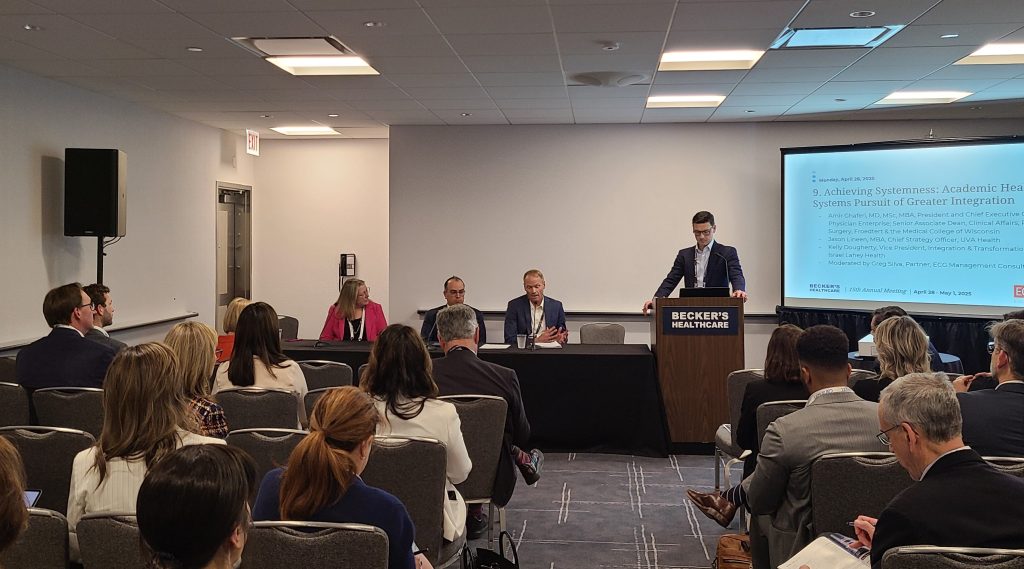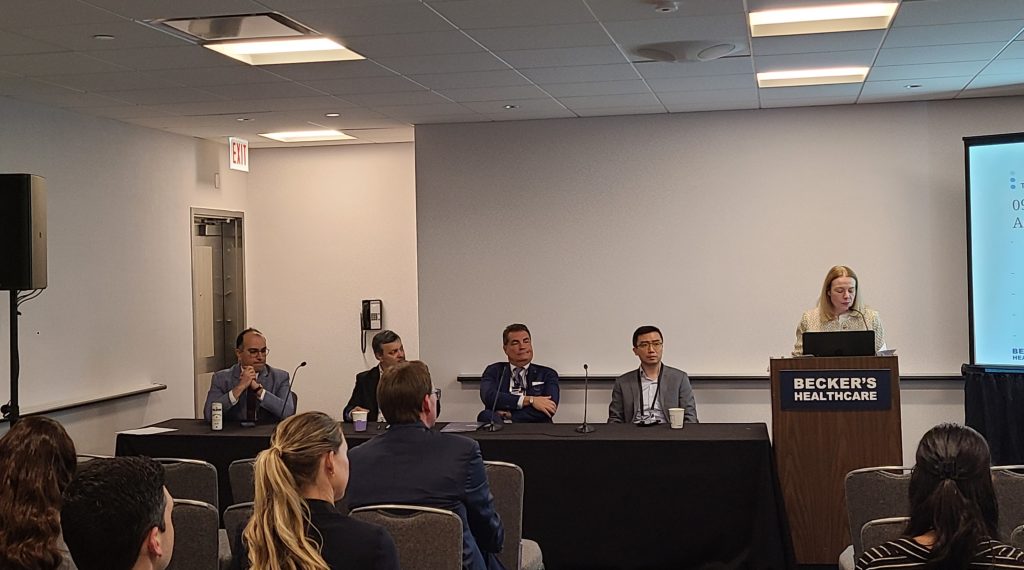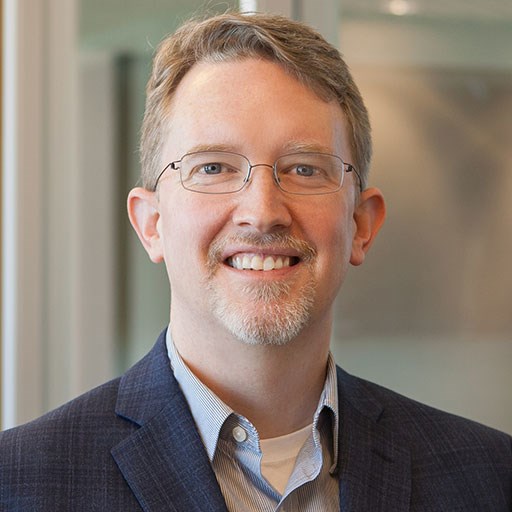ECG partner Leah Gassett opened her session at Becker’s 15th Annual Meeting with something of a sheepish admission—the topics for the Academic Medical Center (AMC) Leadership Forum had been agreed upon months in advance, and given how much had changed since then, the conversation that was about to unfold would likely be very different than the one the panelists had originally anticipated.
Uncertainty was the watchword throughout the conference, but it’s fair to say that no area of healthcare has seen as much upheaval as the academic medicine space. A flurry of presidential executive orders and looming policy changes have AMC leaders grappling with existential questions as they await possible Medicaid cuts, stringent limits on research funding, and grant terminations.
Against that backdrop, ECG’s Academic Healthcare leaders facilitated three interactive panels at the AMC Forum last month, welcoming c-suite and physician leaders for candid conversations about the current state and future of academic medicine. And if there was one overall takeaway, it was that despite the headwinds, AMCs are still pursuing opportunities for partnership, innovation, and growth.
Below are a few themes from ECG-led panels.
Achieving Systemness: Academic Health Systems’ Pursuit of Greater Integration
The need for AMCs to consider traditional and nontraditional partnerships was a common refrain in last year’s AMC Forum, and panelists again emphasized that collaboration—via mergers, acquisitions, and innovative partnership agreements—was the best way to expand care delivery in a state or community. In the current climate, it might be key to survival. But as ECG partner and panel moderator Greg Silva noted, AMCs can’t be health systems in name only—they need to work as a true system.
That gets increasingly difficult as AMCs grow their footprint, but panelists agreed that relationship management is key to a successful integration.
- Operationalizing the vision: Strategy discussions leading up to a merger often result in goals and visions that are highly aspirational. It’s in the implementation and integration process that those objectives get grounded in reality. Communication and transparency are essential—with clear-cut KPIs and dashboards to measure progress. Establish up front what success looks like and how long it will take to achieve.
- Promoting a like-minded culture: Culture clashes have doomed many a merger. As academic organizations increasingly partner with community physicians, they need to foster an environment of mutual respect and a shared vision. Leaders should approach other organizations’ ideas and best practices with curiosity and an open mind—that way, as one participant said, “a lot of doors open quickly.”
- Messaging from leadership: Leadership needs to ensure that the benefits of the integration are understood—not just by the combined organization, but by the community. As one panelist urged: articulate why something is an imperative, communicate it, and then overcommunicate it; without that consistent messaging, some people in the organization might disengage. Be honest about the challenges, and celebrate the successes. That messaging should also extend to the community—if your combined organization is offering patients better-quality care or enabling them to receive care closer to home, ensure the outreach is clear.

ECG partner Leah Gassett opened her session at Becker’s 15th Annual Meeting with something of a sheepish admission—the topics for the Academic Medical Center (AMC) Leadership Forum had been agreed upon months in advance, and given how much had changed since then, the conversation that was about to unfold would likely be very different than the one the panelists had originally anticipated.
Uncertainty was the watchword throughout the conference, but it’s fair to say that no area of healthcare has seen as much upheaval as the academic medicine space. A flurry of presidential executive orders and looming policy changes have AMC leaders grappling with existential questions as they await possible Medicaid cuts, stringent limits on research funding, and grant terminations.
Against that backdrop, ECG’s Academic Healthcare leaders facilitated three interactive panels at the AMC Forum last month, welcoming c-suite and physician leaders for candid conversations about the current state and future of academic medicine. And if there was one overall takeaway, it was that despite the headwinds, AMCs are still pursuing opportunities for partnership, innovation, and growth.
Below are a few themes from ECG-led panels.
Defining and Realizing the Value of Research within the Health System
The need for AMCs to consider traditional and nontraditional partnerships was a common refrain in last year’s AMC Forum, and panelists again emphasized that collaboration—via mergers, acquisitions, and innovative partnership agreements—was the best way to expand care delivery in a state or community. In the current climate, it might be key to survival. But as ECG partner and panel moderator Greg Silva noted, AMCs can’t be health systems in name only—they need to work as a true system.
That gets increasingly difficult as AMCs grow their footprint, but panelists agreed that relationship management is key to a successful integration.
- Operationalizing the vision: Strategy discussions leading up to a merger often result in goals and visions that are highly aspirational. It’s in the implementation and integration process that those objectives get grounded in reality. Communication and transparency are essential—with clear-cut KPIs and dashboards to measure progress. Establish up front what success looks like and how long it will take to achieve.
- Promoting a like-minded culture: Culture clashes have doomed many a merger. As academic organizations increasingly partner with community physicians, they need to foster an environment of mutual respect and a shared vision. Leaders should approach other organizations’ ideas and best practices with curiosity and an open mind—that way, as one participant said, “a lot of doors open quickly.”
- Messaging from leadership: Leadership needs to ensure that the benefits of the integration are understood—not just by the combined organization, but by the community. As one panelist urged: articulate why something is an imperative, communicate it, and then overcommunicate it; without that consistent messaging, some people in the organization might disengage. Be honest about the challenges, and celebrate the successes. That messaging should also extend to the community—if your combined organization is offering patients better-quality care or enabling them to receive care closer to home, ensure the outreach is clear.

Bridging Gaps and Fostering Growth at Academic Medical Centers
ECG’s Leah Gassett explained that some of the “gaps” she and her panel planned to discuss had become chasms in light of changes at the federal level. But as panelists throughout the AMC Forum noted time and again—there are opportunities to improve, even in a changing and uncertain world.
- Prioritizing use cases for AI: AI was another recurring topic throughout the conference, and it seems inspire a blend of hope, debate, confusion, and anxiety. Many attendees seem to believe that AI technologies will play some role in alleviating the workforce shortage. Others fear if it will wipe out humans’ jobs.
Panelists hope for something in between—AI augmenting workers, not replacing them. Organizations that have adopted ambient listening have reported high rates of physician satisfaction. And as one panelist noted, we’re still a long way from AI causing an existential crisis. Most organizations are “nibbling around the edges of AI,” but it’s unclear whether anyone has a true strategy at this point. - Rethinking research: The majority of clinical research in the US has long been funded by the government. The current turmoil may be an opportunity to find new ways to pay for and organize research. Panelists acknowledged there was waste in the previous system, and a more efficient approach with greater accountability could ultimately be a silver lining beneath the tumult. All agreed that in the current environment, we need to accelerate and improve our ability to collaborate within and across organizations, and we no longer have the luxury of working in silos.
- Looking to future leaders: Leah asked today’s leaders what it will take for tomorrow’s leaders to be successful in academic medicine. The next generation of leaders will need to look at every problem as an opportunity, whether it’s ED boarding, waste in the system, staffing shortages, or a pandemic. One participant was encouraged by meeting “young, bright minds with a lot of emotional intelligence,” and said they’ll need those skills to promote collaboration and team building.

